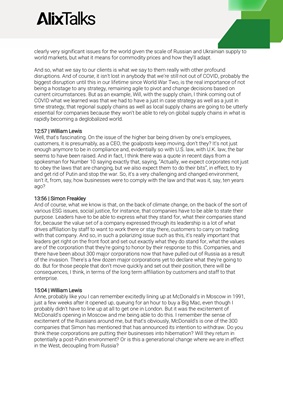
11:18 | William Lewis
And are these surprising to you, Guy, or is it the same pattern as we've seen over the last six
weeks?
11:25 | Guy Harrison
No, I mean, I think for people who've been following it closely, these have been reasonably well
signaled in advance. I think also there is a clear direction of travel that's been established now.
And I think one of the things that's particularly interesting now is, and hopefully we'll talk about
the effectiveness of these sanctions, it's not just those who are close to the Putin regime who
are being punished. But I think what the U.S., the U.K. and the EU are looking to do now is
really try and damage the Russian war machine by targeting people who perhaps aren't
immediately associated with Putin and his regime, but can have a real economic effect on
Russia and how they're funding their war effort, how they're propping up the ruble. And I think,
you know, that has real implications for people who are doing business in Russia or with
Russian entities at the moment.
12:23 | William Lewis
Ok, well look, that's great. That level sets everyone on the call. So, we know who we are, and it
remains a fast moving situation. Of course, if any news breaks in the course of this meeting,
we'll obviously update you as we go along.
But, Tom, I want to come to you on Guy's first point, which begins to take us into the
practicalities for business, because it would appear one of the big themes out of all of this is
it's no longer ok for businesses to simply comply with the law, even laws that are changing
that fast. The added complexity of trying to keep up with different laws in the sanctions realm
that differ by geography, and also have a very, very good ear out for how their broader
stakeholder environment actually wants them to behave in regard to any involvement to
Russia. Can you tell us a bit about that, please?
13:14 | Tom Scampion
Well, it's interesting. I've got a couple of perspectives, and I like Wendy's point about the fact
that these are complex sanctions. And I thought I might just give it an example about the
complexity, because I would argue that banks are on the front line, they're the institutions that
are meant to sort of translate the designations into prohibitions and the conditions that have
to be applied. But it's incredibly complicated if you're a bank at the moment dealing with this
volume of challenge. And I absolutely buy Guy's point that you have to make a policy call. How
close do you want to be to the actual letter of the law, and how much further do you wish to
go? You'll notice Jamie Dimon made the comment, I think it was yesterday or today, that JP
morgan are happy to say that if the sanctions cost them money, they're costing money for the
right thing if it's in the national security interest. So, I think that there is clearly a decision to
make that is beyond the simple letter of the law when it comes to compliance.
But let me just give you a practical example of what it feels like to be in a bank at the moment.
In 2014, after the Crimea annexation, 200 entities were designated. So, 200 entities and
individuals added to the list, roughly 200. That ended up being about 7000 entities that had
connections to those entities. Now, you don't know that off the bat. You don't know that
immediately, you know that there's 200, but who are they connected to? What are their
networks? That's incredibly hard to figure out, especially when we've got five times the volume